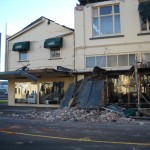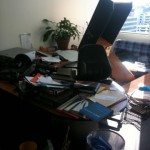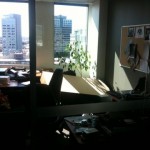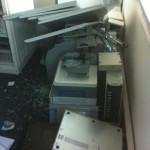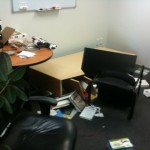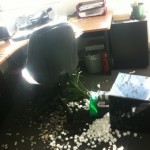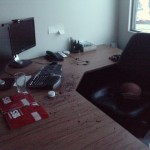At 4:35 AM yesterday, I was shaken from my bed by a huge earthquake. The biggest one here in New Zealand since the quake in 1931 destroyed much of Napier on the North island.
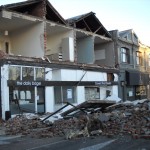 I jumped out of bed and stood in the doorway to the bedroom and just hung on. The apartment I live in is six floors up so there was no question of running outside.
I jumped out of bed and stood in the doorway to the bedroom and just hung on. The apartment I live in is six floors up so there was no question of running outside.
The first shock was only a precursor to what followed and as I stood in the doorway, it just seemed to get worse. I remember thinking that if it got bad enough, the building would go down and I’d be almost certainly be killed. But, there was nothing to do but hang on and see what would happen next.
Eventually, it slowed down. The building was, as you can imagine, swaying and creaking and making a lot of noise. And there were the sounds of things falling and breaking everywhere. The building continued to move and settle for quite awhile afterwards.
While the quake was in progress and I was in the doorway, I had a clear view out the bedroom window to the west and I could see great flashes of light illuminate the sky several times during the quake. At the time, I assumed they must be electrical transformers exploding. The lights flickered on and off and I heard my computer turn itself back on in the middle of the quake.
When it finally stopped, the lights were still on which surprised me.
But what surprised me more was when I turned around and walked into the living room.
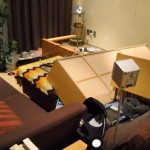
Just after the quake - my living room.
I don’t know what I expected after an earthquake that big, but I remember being very surprised that both the bookcases and the TV table and TV were all down on the floor and my books were everywhere.
As you might think, I just stumbled about and looked at everything for several minutes and then I remembered that I should probably go outside. I put on my pants and got my keys, shirt, coat (2C or 35F outside) and shoes and went downstairs to the parking lot where most of the occupants had gathered.
Some of the long-term people were saying that when these buildings were built 10 years ago, they’d really over-engineered them for earthquakes and that tonight that had all paid off. I couldn’t have agreed more.
I walked around the complex (as did the building manager and several others, I’m sure) and listened for water from broken pipes and checked for cracks, broken windows (none) and fallen masonry (only a small amount).
I’m writing this on Sunday evening nearly 36 hours later and we are still having aftershocks you can clearly feel.
When the sun came up Saturday morning, I went out for a walk in the neighborhood to see the damage.
You can find photos of Christchurch after the quake on-line here.
And here.
I have to say that building codes are wonderful things. Only three people were injured badly here and no one died. Contrast that with quakes in the third world such as the recent one in Haiti.
Some areas survived with very little damage and others were badly trashed as you’ll see in the photos. Rail lines broken, bridges damaged, ground lifted or fallen, roads buckled, water mains broken and electricity off to much of the city.
About the only thing that turned out nice is that Saturday was a beautiful and unseasonably warm day.
It felt a bit like some sort of strange party as everyone was out walking and looking at the damage. Cafes and coffee shops, if they were open, were jammed.
My place is put back into order. The rest of the city will take months and many millions of dollars. The building where I work seems to be intact but I’ve been told that we’ll be working from home for a few days and that should be different and interesting.
The good news? There probably won’t be another event like this here in my lifetime now that the fault has released some of its energy.
-

-

-
Just after the quake – my living room.
-

-

-

-

-
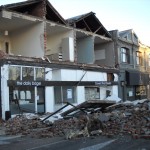
-

-
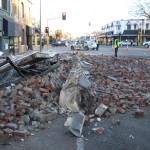
-

-
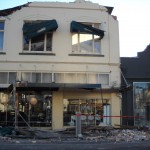
-
